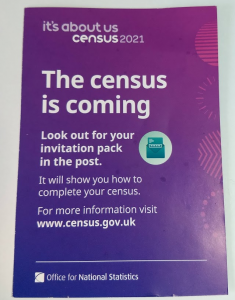 David Martin, Deputy Director of the UK Data Service, introduces our blog series on the 2021/2022 UK censuses, with a pertinent discussion of ‘why now?’
David Martin, Deputy Director of the UK Data Service, introduces our blog series on the 2021/2022 UK censuses, with a pertinent discussion of ‘why now?’
The decennial census in England, Wales and Northern Ireland will be held on 21 March 2021, while Scotland’s census has been postponed until spring 2022. The challenges of running a census during these exceptional times should not be underestimated, but the systems, people and legislation are already in place, and as a society we need the census data more now than ever.
The last time a census was not held in the year ending -1 was in 1941, but a national emergency registration of the population had been held in 1939 at the outbreak of the Second World War.
The most novel feature of the 2021 census operations is that they have been designed from the outset to be ‘digital first’, with around 75% of the population expected to complete the questionnaire online.

The census agencies have been planning extensively, including a large rehearsal of this approach in 2019 which found it to work well. Most households will receive an initial invitation to complete their census online using a unique access code, but in areas where online response is expected to be low, paper forms will still be delivered – in fact, both paper and online channels will be available to everyone.
The conduct of the decennial census is a colossal undertaking, involving a large temporary workforce and a complex series of contracts and services necessary to ensure that the whole exercise works smoothly. All of these complex (and expensive) systems are already in place for the 2021 enumeration, and although it may be tempting to think that the whole exercise could be put off, that would necessitate a huge waste of public money in a time of austerity – and in many ways our need for the data from the census is currently greater than ever.
Both Brexit and the Covid-19 pandemic have rightly focused public attention on official statistics and led to widespread discussion of measures and concepts that would not usually gain so much airtime.
Amid the noise, the high quality ONS Covid infection survey demonstrates the ability of the UK statistical agencies to collect well-designed statistics on key issues which are independent of national politics. Issues of social change, local population characteristics and inequality have moved to the fore of public debate.
Even the most basic questions about Covid prevalence and death rates and how they vary across communities, age group and ethnic groups are fundamentally rooted in our ability to access high quality population statistics. The census underpins our ability to answer all of these questions – no other data source provides comparable levels of population coverage, detail for small areas or such a complete picture of (for example) ethnicity and household structures.
In many instances, the best detailed estimates we currently have their origins in the 2011 census datasets. There are already important moves to understand how society will be able to “build back better” but these will require evidence, and the 2021/22 census provides a unique opportunity to re-base these detailed statistics to understanding to the time of the pandemic.
In an era which has also seen much doubt cast on factual information, the census also offers us a unique opportunity to obtain a single, high-quality picture of the UK population at the start of the 2020s on which policymakers, planners, businesses and campaigners can base their efforts.
The UK Data Service provides a unique range of census data outputs and resources, including access to census datasets dating from 1961 to 2011.
Our expert team hosts
- data about areas
- data about migration and travel-to-work flows between areas
- digital boundaries
- lookup tables
- samples of anonymized records.
We also support research users with access to more secure and detailed versions of some of these data held by the census agencies.
We engage extensively with the UK agencies to advocate for census data users and provide a wide range of training and advice – and we are standing by to support the critical research and insight that will be based on 2021 census results.
The UK Data Service will be running a webinar: 2021 Census: What to expect from the UK Data Service on Thursday 18th March, 12.00-12.45.
Find out more and how to book your place.
About the author
David Martin is a Professor of Geography at the University of Southampton and a Deputy Director of the UK Data Service. He has been involved in several major data initiatives, including as Director of ESRC’s former Census Programme. His research in geographic information science led to development of the system of census output areas currently used in England, Wales and Northern Ireland. David was awarded an OBE in 2019 for services to Geography and Population Studies.
